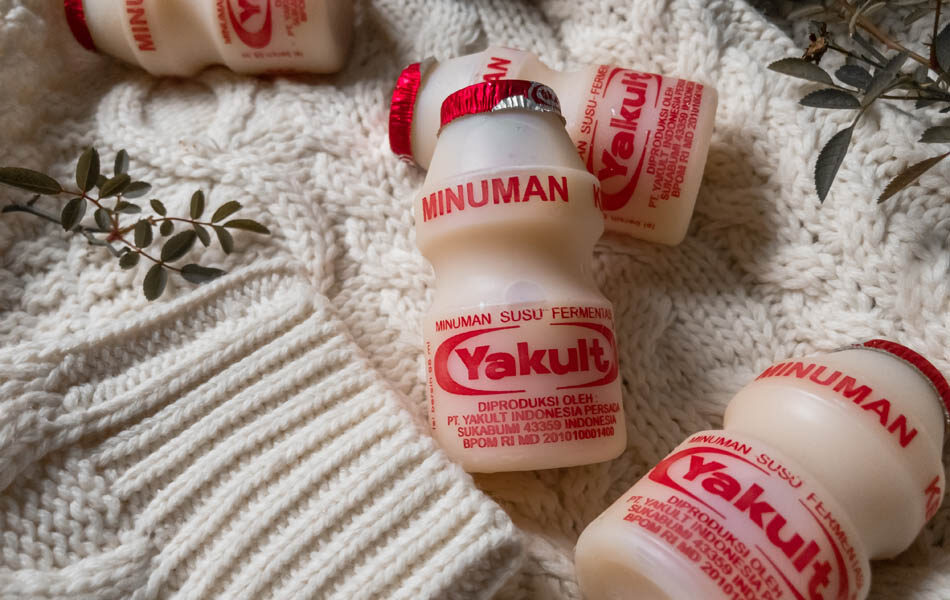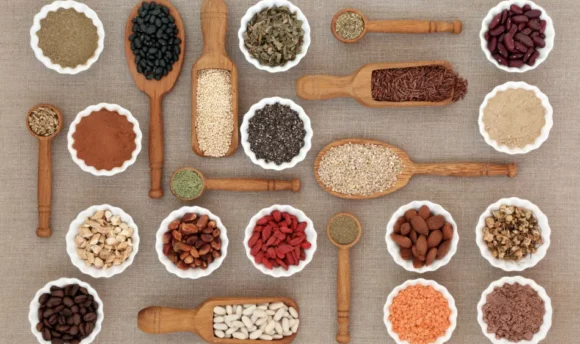Is Yakult Healthy? Ingredients and Health Benefits
Yakult is a popular fermented health beverage advertised as a delicious probiotic drink. However, is it good for you? Let’s talk about it!

Like many probiotic drinks, Yakult is famous for its tangy and tart taste as well as its many proclaimed health benefits. It is a fermented milk beverage served in lovely small bottles.
You may know that you should be consuming probiotics, but what do probiotics actually do? This article will cover probiotics, the benefits of Yakult as a source of probiotics, and much more.
Thank you for your answer
Health Reporter Surveys
What Is Yakult?
Yakult is a milk-based beverage fermented by good bacteria, specifically L. Paracasei Strain Shirota. It is a probiotic drink with a tangy, milky, and sweet taste.
Yakult is produced in small 80-milliliter bottles and can be found in the refrigerated section of some grocery stores and Asian markets.
Is Yakult Healthy?
Yakult is a healthy beverage because it is an excellent source of good probiotics, vitamins, and minerals, such as calcium and potassium. In addition, it supports a healthy gut and digestive system.
3 Health Benefits of Yakult
Now let’s dive into some of the main benefits of this tangy and sweet probiotic drink. Read on to learn more!
#1 Good source of probiotics
The main appeal of Yakult is that it is a probiotic drink. According to the National Institutes of Health, research supports the use of probiotics for certain types of diarrhea, irritable bowel syndrome, and more.
However, even if you do not have any of these issues, probiotics are essential for supporting a healthy gut microbiome. The gut microbiome is the community of healthy (and unhealthy!) bacteria living in the digestive tract.
Consuming a Yakult probiotic drink can help provide good bacteria to take over the harmful bacteria in the gut, which can positively affect many aspects of health.
Probiotics can also impact upper respiratory tract infections. A 2015 study in the Cochrane Database of Systematic Reviews found that probiotics were more effective than a placebo in preventing upper respiratory tract infections.
#2 Rich in potassium
Potassium is an essential mineral that acts as an electrolyte in the body.
Electrolytes, such as potassium and sodium, promote hydration and fluid balance in the body.
#3 Contains calcium for strong bones
Additionally, since Yakult contains non-fat milk powder, it has some calcium. Calcium works in conjunction with vitamin D to support strong bones and teeth.
3 Side Effects of Yakult
Now that we’ve talked about the benefits of Yakult, let’s discuss some of the potential downsides of drinking this drink.
#1 Can cause gastrointestinal distress
According to the National Institutes of Health, some common side effects of probiotics include gas or other gastrointestinal symptoms. However, these side effects are mild, if they occur at all.
If you experience gastrointestinal side effects of drinking Yakult, try consuming it in smaller amounts and gradually increasing it.
#2 May increase blood sugar levels
Since beverages like Yakult are high in sugar but low in protein, fat, or fiber, there is nothing to slow down the speed of sugar through the digestive system.
Therefore, it can spike blood sugar levels. So, pair your Yakult probiotic drink with some fiber, healthy fat, and protein, such as almonds or avocado, which slows down sugar in the digestive system.
Additionally, try Yakult Light, which has much less sugar.
#3 Easy to over-consume
Another downside to consuming Yakult is the small serving size, which makes it easy to over-consume. You can quickly drink too many bottles since it contains only 80 milliliters of the beverage.
With 10 grams of sugar in one bottle, 10 can quickly become 20, 30, or even 40 grams.
Yakult Nutrition Facts
Now that we have gone through the pros and cons of drinking Yakult, let’s dive more in-depth into the nutritional information. Read on!
Nutritional value (per 100g)
| Calories/Nutrient (per 100g) | Amount |
| Calories (kcal) | 62 |
| Sodium (mg) | 19 |
| Net Carbs (g) | 15 |
| Fiber (g) | 0 |
| Sugar (g) | 12.5 |
| Fats (Total) | 0 |
| Protein (g) | 1.25 |
| Cholesterol (mg) | 0 |
Source: https://fdc.nal.usda.gov/fdc-app.html#/food-details/2332523/nutrients
Low in calories and fats
Keep in mind that one bottle contains 80 milliliters of the liquid. Therefore, per small bottle, there are only 50 calories. This makes this beverage an excellent option for those trying to lose or maintain their current weight.
Yakult is also free of cholesterol and is, therefore, in alignment with the 2020–2025 Dietary Guidelines for Americans’ recommendation to consume as little dietary cholesterol as possible.
Low in protein
There is only 1 gram of protein per 80-milliliter (or 80-gram) bottle of Yakult. However, for such a small quantity of liquid, 1 gram of protein per bottle is still relatively significant.
Protein is essential for building and maintaining muscle. Although Yakult is not considered a good source of protein, it can supplement a regular, healthy, balanced diet rich in high-quality protein, such as meat, dairy, and eggs.
High in carbohydrates
A single Yakult bottle contains 12 grams of carbohydrates and 10 grams of sugar. The carbohydrates come from the milk powder as well as the sugar it contains.
The American Heart Association recommends that women consume no more than 6 teaspoons or 25 grams of sugar a day, while men should have no more than 9 teaspoons or 32 grams.
Of the 10 grams of sugar in Yakult, 9 are considered added sugar, according to the nutrition facts label.
FAQs
Yakult is healthy and good for you because it is rich in probiotics, vitamins, and minerals, such as calcium and potassium. It is low in calories and fat as well.
Yakult is an excellent probiotic because it contains the L. Paracasei Strain Shirota. However, neither the bottle nor the product website discloses how many viable cells or colony-forming units (CFU) are in the product.
Since there are some minor gastrointestinal side effects of probiotics, you may experience digestive discomfort, such as gas, if you drink too many bottles of Yakult.
The Yakult website recommends consuming 1–2 bottles per day as part of a healthy diet.
Unfortunately, probiotics can contribute to constipation as a mild side effect. For more information about probiotics and constipation, check out this resource.
A Word From a Nutritionist
There are many significant benefits to drinking Yakult. Yakult probiotic drinks are an excellent source of good bacteria that can support good health. Drinking a Yakult bottle or two daily can help with gut health and even provide a small amount of protein and calcium.
For an option that is lower in sugar and calories, but still provides the same probiotic benefits, try Yakult Light. Yakult light only contains 25 calories and 3 grams of sugar.
If you do prefer regular Yakult, perhaps stick with just 1 per day or 1 every other day to avoid consuming too many grams of added sugar.
Since it is a dairy product and a carbohydrate source, drink Yakult with protein and healthy fat, such as a handful of almonds or some cubes of cheese, to make it a balanced snack that keeps you feeling full and satisfied.
Conclusion
Probiotics can support gut health, promote a healthy immune system, boost heart health, and much more.
Yakult contains essential vitamins and minerals, such as potassium and calcium, which provide many health benefits as well, including helping fluid balance and bone and teeth strength.
Overall, drink Yakult or two each day to boost your health and nutrition.

















































 Select your language:
Select your language: 








